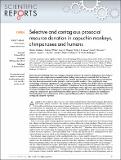Files in this item
Selective and contagious prosocial resource donation in capuchin monkeys, chimpanzees and humans
Item metadata
| dc.contributor.author | Claidière, Nicolas | |
| dc.contributor.author | Whiten, Andrew | |
| dc.contributor.author | Mareno, Mary C | |
| dc.contributor.author | Messer, Emily J E | |
| dc.contributor.author | Brosnan, Sarah F | |
| dc.contributor.author | Hopper, Lydia M | |
| dc.contributor.author | Lambeth, Susan P | |
| dc.contributor.author | Schapiro, Steven J | |
| dc.contributor.author | McGuigan, Nicola | |
| dc.date.accessioned | 2015-01-20T10:01:08Z | |
| dc.date.available | 2015-01-20T10:01:08Z | |
| dc.date.issued | 2015-01-06 | |
| dc.identifier | 162274914 | |
| dc.identifier | 1905aa0b-0566-4c6b-8243-e3795456b8ea | |
| dc.identifier | 25559658 | |
| dc.identifier | 000347795700001 | |
| dc.identifier | 84950255706 | |
| dc.identifier.citation | Claidière , N , Whiten , A , Mareno , M C , Messer , E J E , Brosnan , S F , Hopper , L M , Lambeth , S P , Schapiro , S J & McGuigan , N 2015 , ' Selective and contagious prosocial resource donation in capuchin monkeys, chimpanzees and humans ' , Scientific Reports , vol. 5 , 7631 . https://doi.org/10.1038/srep07631 | en |
| dc.identifier.issn | 2045-2322 | |
| dc.identifier.other | ORCID: /0000-0003-2426-5890/work/65013988 | |
| dc.identifier.uri | https://hdl.handle.net/10023/6028 | |
| dc.description | The project was supported by a grant from the John Templeton Foundation (Ref 20721) to AW. | en |
| dc.description.abstract | Prosocial acts benefitting others are widespread amongst humans. By contrast, chimpanzees have failed to demonstrate such a disposition in several studies, leading some authors to conclude that the forms of prosociality studied evolved in humans since our common ancestry. However, similar prosocial behavior has since been documented in other primates, such as capuchin monkeys. Here, applying the same methodology to humans, chimpanzees, and capuchins, we provide evidence that all three species will display prosocial behavior, but only in certain conditions. Fundamental forms of prosociality were age-dependent in children, conditional on self-beneficial resource distributions even at age seven, and conditional on social or resource configurations in chimpanzees and capuchins. We provide the first evidence that experience of conspecific companions' prosocial behavior facilitates prosocial behavior in children and chimpanzees. Prosocial actions were manifested in all three species following rules of contingency that may reflect strategically adaptive responses. | |
| dc.format.extent | 3143885 | |
| dc.language.iso | eng | |
| dc.relation.ispartof | Scientific Reports | en |
| dc.subject | BF Psychology | en |
| dc.subject | NDAS | en |
| dc.subject | BDC | en |
| dc.subject | R2C | en |
| dc.subject.lcc | BF | en |
| dc.title | Selective and contagious prosocial resource donation in capuchin monkeys, chimpanzees and humans | en |
| dc.type | Journal article | en |
| dc.contributor.sponsor | John Templeton Foundation | en |
| dc.contributor.institution | University of St Andrews. School of Psychology and Neuroscience | en |
| dc.contributor.institution | University of St Andrews. ‘Living Links to Human Evolution’ Research Centre | en |
| dc.contributor.institution | University of St Andrews. Institute of Behavioural and Neural Sciences | en |
| dc.contributor.institution | University of St Andrews. Centre for Social Learning & Cognitive Evolution | en |
| dc.identifier.doi | https://doi.org/10.1038/srep07631 | |
| dc.description.status | Peer reviewed | en |
| dc.identifier.grantnumber | 20721 | en |
This item appears in the following Collection(s)
Items in the St Andrews Research Repository are protected by copyright, with all rights reserved, unless otherwise indicated.

